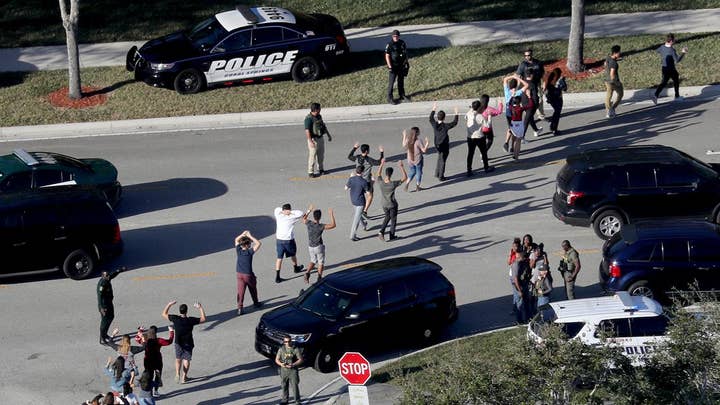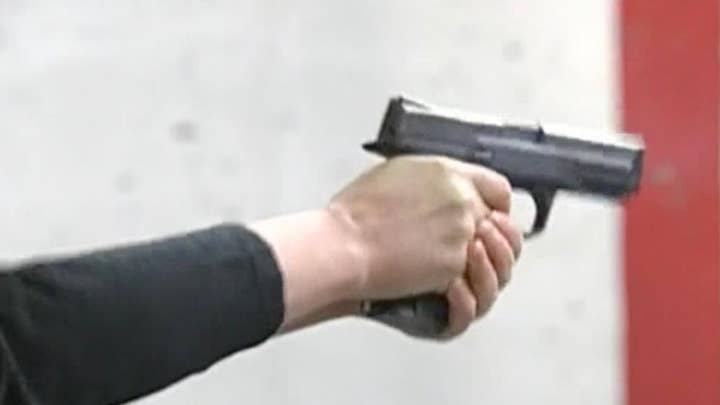Is 'culture of death' a sad reality in American society?
For Kentucky Gov. Matt Bevin stopping mass shootings goes beyond gun control to the actual fabric of American culture; Douglas McKelway reports.
Most humans cannot fathom — or choose not to fathom — the depths of depravity that would allow a young man to shoot up a school filled with children.
“You don’t shoot up a high school without thinking about it for a very, very, very, long and dark time,” said Dr. Jordan Peterson, a psychologist at the University of Toronto. “You go places when you’re doing that that no reasonable person would ever want to go.”
After the school shooting in Parkland, Fla., many have blamed lax gun control laws and an inadequate mental health support system for why there is an uptick in mass shootings.
But experts say there are other factors to consider.
The phenomenon of mass school shootings, and the apparent uptick in them in recent years, occurs as violent crime rates have been declining.
A confluence of factors may be contributing to it.
For one, gender is a big factor.
“An epidemic of nihilistic hopelessness,” Peterson said. “Not just young men, young people in general, but young men are more likely to act it out in a violent manner.”
There is also a contagion effect of mass shootings. Killers know they’ll get the nonstop attention from media outlets — attention they so crave, and often miss out on, in life.
“It’s so spectacular. It gives particularly resentful people who are lost and aiming down, $100 million of free publicity. The stakes are very high. It’s not like they’re ill-informed about their predecessors. There’s an element of competition to this,” Peterson said.
He suggests media ban the names of such killers and limit the coverage of them to help stem the contagion.
Some believe the roots of the mass-shooting phenomenon may lie in the 1960s Cultural Revolution. That epochal time brought welcome change to discrimination against women and minorities. But many contend it led to the tossing out of deeply imbedded traditions of Western Culture from art, architecture, literature, family structure, and traditional roles.
“It’s almost impossible to express how much more important it is to be a mother or a parent who guides rearing and development of a child than it is to be a mere research scientist,” Yale University computer sciences professor David Gelernter said.
Gelernter is blunt about his belief that the ‘60s revolution replaced rigorous scholarship in the American academy with dumbed-down curricula — hurting even Ivy League students.
“They don’t know anything. We’ve given ourselves a pass in educating and rearing them as result of the Cultural Revolution,” he said.
Gelernter argues in his book, “America Lite,” that, as in totalitarian states like Nazi Germany, the Soviet Union and Communist China, American academia underwent a purge of tradition which filtered down through secondary schools — through art, media, and even the family structure.
“We’ve done enormous destruction. We’ve wreaked havoc with our children and our children’s children,” he said.
Now, into a second generation of the students taught this way, secondary schools have more to contend with than they can handle.
“They’re called on to act as parents to those children whose parents aren’t acting like parents. They’re called upon to be psychologists and judicial agents and all of these things, and they simply can’t do it,” Peterson said.
Many feminist critics say the revolution hasn’t evolved enough — that young men and boys are governed by a “toxic” kind of masculinity.
“The man’s fear that he’s losing his power, and because minorities and women are taking higher positions and have more power (than) white men and men in general, they are afraid that they’re going to lose their strength and their virility,” Kathy Areu, publisher of Catalina Magazine, told Fox News’ Tucker Carlson recently.
Peterson and Gelernter believe gun control and mental-health debates that arise with inevitable predictability in the aftermath of a mass shooting can wait.
A higher priority, they say, is to fix the culture and broken boys with time-tested ideals of masculine role modeling, responsibility and sacrifice — as well as the Judeo-Christian ethic upon which Western Culture was built.
“The human need for religion is more desperate than it has ever been. Science, cosmology is every bit as relevant as it’s ever been, and yet we allowed cynics in philosophy and science to drive us away from our roots,” Gelernter said.
Peterson sends this plea to adults who would help disoriented youth: “They need to have one person in their life, one straight arrow that flies true to orient themselves properly. If they don’t have that, they can be easily lost.”
Peterson’s new book addresses this phenomenon, in part: “12 Rules for Life: An Antidote to Chaos” rocketed to No. 1 on Amazon on Jan. 16, its first day of release, and has remained in the top-two spots ever since.

























